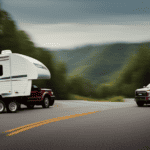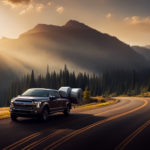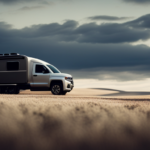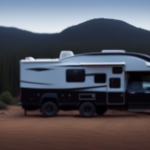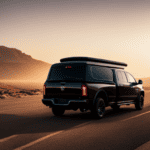Beginners Guides
How Big Of A Camper Can An F150 Pull
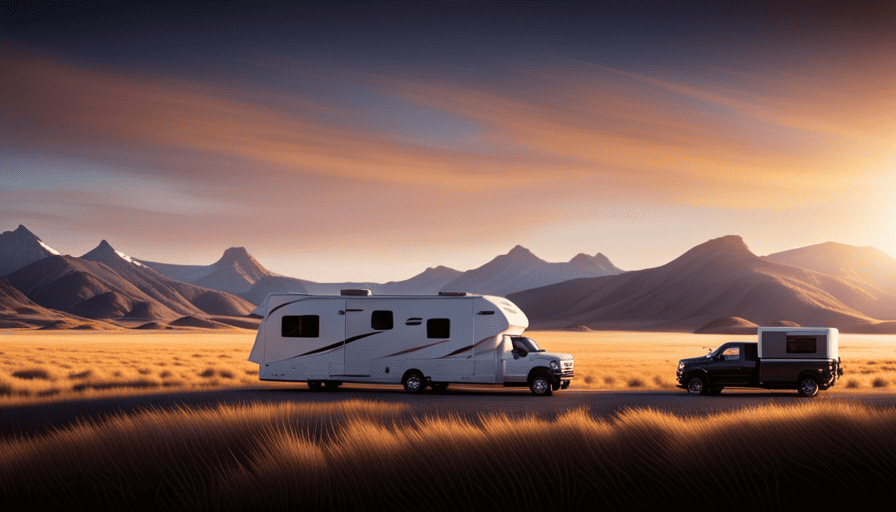
Imagine this scenario: You’re driving along a beautiful road, surrounded by breathtaking views and endless possibilities for adventure. The path stretches out ahead of you, and anticipation builds as you embark on a fresh camping expedition. Yet, one crucial question remains: what is the maximum size camper that my F150 can tow?
As an avid camper and owner of an F150 myself, I understand the importance of finding the perfect match between your truck and camper. In this article, we will explore the ins and outs of towing capacity, discuss the different types of campers compatible with the F150, and provide safety considerations, maintenance tips, and resources to help you find your ideal camper.
Whether you’re a seasoned camper or new to the world of towing, this article will equip you with the knowledge and tools to make an informed decision. So, buckle up and let’s dive into the world of F150 towing and the limitless possibilities it offers for your next camping adventure.
Key Takeaways
- F150 towing capacity ranges from 5,000 to 13,200 pounds.
- Pop-up campers are lightweight and easy to tow with an F150.
- Travel trailers provide more space and amenities than pop-up campers.
- Fifth-wheel trailers require a specialized hitch in the truck bed and have towing capacity limitations.
Understanding Towing Capacity
You’ll be thrilled to learn about the impressive towing capacity of an F150! When it comes to pulling a camper, it’s important to understand the camper weight limits and how they relate to your truck’s towing capacity.
The towing capacity of an F150 can vary depending on the specific model and configuration, but it generally ranges from 5,000 to 13,200 pounds. To determine the maximum weight your F150 can safely tow, you need to consider a few factors.
First, you’ll need to calculate the weight of your camper, including all the gear and supplies inside. This will give you a better idea of the total weight you’ll be towing.
Next, you’ll want to check your F150’s owner’s manual or consult with the manufacturer to find the towing capacity for your specific model. It’s important to note that exceeding the towing capacity can put unnecessary strain on your truck’s engine, transmission, and brakes, potentially causing damage.
Now that you understand the basics of towing capacity, you can move on to determining the right camper size for your F150. By considering factors such as the weight, size, and features of the camper, you can make an informed decision that ensures a safe and enjoyable towing experience.
Determining the Right Camper Size
To find the perfect fit for your F150, consider the ideal size of the recreational vehicle that can be comfortably towed. When choosing the right layout for your camper, there are several factors to consider.
First, think about the number of people who will be using the camper. If you’re planning on traveling with a large family or a group of friends, you’ll want to look for a camper with enough sleeping space and seating areas to accommodate everyone. On the other hand, if it’s just you and a partner, a smaller camper may be more suitable.
Next, think about your budget considerations. Campers come in a wide range of prices, so it’s important to determine how much you’re willing to spend. Consider both the initial cost of the camper and any ongoing expenses, such as maintenance and insurance.
Lastly, think about the amenities you desire. Do you want a full kitchen and bathroom in your camper, or are you willing to sacrifice some luxury for a smaller, more lightweight option?
Choosing the right layout and considering budget considerations will help narrow down your options for the perfect camper to tow with your F150.
In the next section, we will explore the types of campers compatible with the F150.
Types of Campers Compatible with the F150
When it comes to finding the right camper for your F150, there are a few different options to consider.
One popular choice is a pop-up camper, which is lightweight and easy to tow.
Another option is a travel trailer, which offers more space and amenities than a pop-up camper.
Lastly, there are fifth-wheel trailers, which are larger and require a special hitch installed in the bed of the truck.
Each type has its own advantages and considerations, so it’s important to do your research and choose the one that best fits your needs and towing capacity.
Pop-Up Campers
With a pop-up camper, the F150 can effortlessly tow a cozy and compact mobile home for all your camping adventures. Pop-up campers are a great option for those who want to experience the outdoors without sacrificing comfort. These campers are lightweight and can be easily towed by the F150, making them a popular choice among F150 owners.
Pop-up campers offer various features such as foldable beds, kitchenettes, and even bathrooms, providing all the necessities for a comfortable camping trip. When choosing the right pop-up camper for your F150, consider factors such as size, weight, and amenities.
With the right pop-up camper, you can enjoy the convenience and comfort of a mobile home while still being able to explore the great outdoors.
Moving on to travel trailers, these campers offer even more space and amenities for those who need a larger living area.
Travel Trailers
Travel trailers, also known as RVs, provide a spacious and comfortable living area for F150 owners who desire a mobile home with ample amenities for their camping excursions. These versatile trailers come in various sizes and designs, offering a range of features to suit different needs. Some common camper features include a kitchenette, bathroom, sleeping quarters, and storage compartments.
When considering a travel trailer for your F150, it’s important to check the towing regulations to ensure your vehicle is capable of safely pulling the weight of the trailer. Additionally, factors such as the trailer’s weight distribution and tongue weight should be considered to maintain stability while towing.
As we move on to discuss fifth-wheel trailers, it’s important to note that these trailers offer a unique towing setup that requires a specialized hitch in the bed of the truck.
Fifth-Wheel Trailers
If you’re considering a fifth-wheel trailer, you’ll love the luxurious and spacious living quarters it provides for your F150 adventures.
Fifth-wheel trailers are designed to be towed by a pickup truck and are known for their unique hitch system.
To tow a fifth-wheel trailer with your F150, you’ll need a fifth wheel hitch installed in the bed of your truck.
It’s important to note that while fifth-wheel trailers offer ample living space, they also have towing capacity limitations.
The weight of the trailer, along with the weight of any cargo you’re carrying, must not exceed the maximum towing capacity of your F150.
Safety considerations are crucial when towing a fifth-wheel trailer, and in the next section, we’ll explore some important factors to keep in mind.
Safety Considerations
For maximum safety while towing with your F150, it’s important to consider the size and weight of the camper you plan to pull. One of the key factors to keep in mind is weight distribution. It’s crucial to ensure that the weight of the camper is evenly distributed across the trailer and the truck. This can be achieved by using weight distribution hitches, which help to evenly distribute the weight and prevent excessive strain on the rear of the F150.
Another important aspect to consider is the towing technique. When towing a camper, it’s essential to maintain a safe driving speed and increase the following distance to allow for longer stopping distances. Additionally, it’s advisable to use the trailer brake controller to ensure effective braking and control. This will help prevent swaying or instability of the camper while on the road.
Incorporating these safety considerations will help ensure a safe towing experience with your F150. However, it’s important to remember that there are additional equipment and accessories that can further enhance safety and convenience while towing. These include trailer sway control systems, backup cameras, and extended side-view mirrors. These accessories can provide additional visibility and stability, making your towing experience even safer and more enjoyable.
Additional Equipment and Accessories
Enhance your towing experience with the F150 by equipping it with additional accessories and equipment for added safety and convenience. When it comes to camper customization, there are a variety of equipment and gear options available that can make your journey more enjoyable and efficient.
-
Hitch and Receiver: A high-quality hitch and receiver is essential for towing a camper. Make sure it’s properly installed and can handle the weight of your camper. This will provide a secure connection between your F150 and the camper, minimizing any swaying or instability.
-
Towing Mirrors: Investing in towing mirrors will greatly improve your visibility while towing a camper. These mirrors extend the field of vision, allowing you to see any vehicles or obstacles that may be in your blind spots. This is especially important when changing lanes or maneuvering in tight spaces.
-
Brake Controller: A brake controller is a crucial piece of equipment that ensures your camper’s brakes are synchronized with your F150’s brakes. This helps prevent excessive wear on the F150’s brakes and allows for smoother and safer stops.
By equipping your F150 with these additional accessories and equipment, you can enhance your towing experience and ensure a safer journey. Now, let’s move on to some helpful tips for traveling with a camper.
Tips for Traveling with a Camper
Now that we’ve covered additional equipment and accessories for your camper, let’s move on to some tips for traveling with a camper. As an experienced camper myself, I understand the importance of making your trip as comfortable and enjoyable as possible.
If you’re planning to bring your furry friends along, it’s essential to consider their needs during the journey. Make sure to bring enough food, water, and any necessary medications for your pets. It’s also a good idea to research pet-friendly campsites along your route and make reservations in advance.
Another aspect of camping that many people enjoy is cooking delicious meals in the great outdoors. I recommend researching camping recipes ahead of time and preparing as much as you can before hitting the road. This’ll save you time and ensure that you have tasty meals during your trip.
Now that we’ve covered tips for traveling with a camper, let’s move on to the next section about maintenance and upkeep. It’s important to keep your camper in good condition to ensure a smooth and worry-free journey.
Maintenance and Upkeep
To keep your home on wheels running smoothly, maintaining and caring for your traveling sanctuary is like tenderly nurturing a blooming garden. Regular maintenance is essential to ensure the longevity and reliability of your camper. Here are some maintenance tips to keep in mind.
Firstly, it’s crucial to have a thorough inspection of your camper before each trip. Check the tires for proper inflation and wear, inspect the brakes, and ensure all lights are functioning correctly. Regularly lubricate the moving parts such as hinges and slide-outs to prevent rust and ensure smooth operation.
Another important aspect of camper maintenance is keeping the interior and exterior clean. Regularly wash the exterior to remove dirt, grime, and any potential damage-causing substances. Clean the interior regularly, paying attention to upholstery, countertops, and appliances, to maintain a fresh and comfortable living space.
Common camper issues may include plumbing leaks, electrical problems, or malfunctioning appliances. It’s essential to address these issues promptly to avoid further damage. Familiarize yourself with your camper’s user manual and learn basic troubleshooting techniques.
Proper maintenance and upkeep are crucial for a hassle-free camping experience. By following these maintenance tips and promptly addressing common camper issues, you can ensure the longevity and reliability of your traveling sanctuary.
Now, let’s explore some modifications for towing an f150 without compromising safety and performance.
F150 Modifications for Towing
If you’re looking to maximize the safety and performance of your F150 when towing, consider making these modifications. The F150 is already a capable truck when it comes to towing, but with a few adjustments, you can enhance its capabilities even further. One of the first things you should consider is upgrading your trailer hitch. A heavy-duty hitch will provide a stronger connection between your truck and the camper, increasing stability and reducing the risk of accidents. Additionally, installing a brake controller is crucial for towing larger campers. This device allows you to control the camper’s brakes from the cab of your truck, ensuring smoother stops and greater control.
Another modification to consider is upgrading your suspension system. Towing places additional strain on your truck’s suspension, so upgrading to a heavy-duty suspension kit will provide better support and stability. Additionally, installing towing mirrors will give you better visibility, allowing you to see around your camper more easily. Finally, consider upgrading your tires to ones that are designed for towing. These tires have a higher load rating and improved traction, ensuring a safer and more efficient towing experience.
By making these modifications, you can maximize your F150’s towing capacity and improve its overall performance. Next, we’ll explore the resources and communities available to F150 owners who are interested in towing.
Resources and Communities
Looking for resources and communities to connect with other F150 owners who share your passion for towing? Joining these groups is like hitching your truck to a network of like-minded enthusiasts, providing you with invaluable support and knowledge as you navigate the road of towing.
RV forums are a great place to start, as they offer a wealth of information from experienced campers and truck owners. These forums allow you to ask questions, share your own experiences, and learn from others who have gone through similar journeys.
In addition to RV forums, there are also towing capacity calculators available online. These calculators help you determine the maximum weight your F150 can safely tow. By inputting your truck’s specifications, such as engine size, axle ratio, and towing package, these calculators provide you with an accurate towing capacity. This information is crucial when selecting the right camper for your F150.
With the help of these resources and communities, you can confidently explore the world of towing with your F150. They provide a supportive environment where you can learn from others, share your knowledge, and make informed decisions about your towing needs. So, whether you’re a seasoned camper or just starting out, connecting with these groups will help you find your perfect camper and make the most of your F150’s towing capabilities.
Conclusion: Finding Your Perfect Camper
Once you’ve connected with the resources and communities available, you’ll be well-equipped to discover the ideal camper that perfectly complements your F150’s towing capabilities.
When it comes to finding the best campgrounds, it’s important to consider your personal preferences and the amenities that are important to you. Some campgrounds may offer full hookups, while others may be more rustic and primitive. Researching and reading reviews from fellow campers can help you narrow down your options and find the perfect spot for your camping adventures.
Budgeting for camping trips is another crucial aspect to consider. While camping can be a more affordable option compared to other types of vacations, there are still costs to consider. In addition to the cost of the camper itself, you’ll need to budget for campground fees, fuel expenses, and any necessary camping gear or supplies. It’s important to plan ahead and set a budget that works for you, so you can enjoy your camping trips without any financial stress.
By utilizing the resources and communities available to you, you can confidently navigate the world of campers and find the perfect fit for your F150. Whether you’re looking for a small and compact camper or a larger, more luxurious option, there are countless possibilities out there waiting to be discovered. So, start your research, connect with fellow campers, and get ready to embark on unforgettable camping adventures with your F150 and the perfect camper in tow.
Frequently Asked Questions
Can an F150 tow a fifth-wheel camper?
Yes, an F150 can tow a fifth-wheel camper. However, there are pros and cons to consider.
The advantage of a fifth-wheel camper is its spaciousness and stability while towing. On the other hand, it requires a specialized hitch installed in the bed of the truck, limiting cargo space.
If you prefer alternatives, heavy-duty trucks like the Ford F-250 or Chevrolet Silverado 2500HD offer higher towing capacities and may be better suited for towing a fifth-wheel camper.
What is the maximum weight an F150 can tow?
The maximum towing capacity of an F150 can vary depending on the specific model and configuration. However, in general, an F150 can tow up to a maximum of 13,200 pounds when properly equipped.
It’s important to note that towing such heavy loads may require recommended towing upgrades, such as a heavy-duty tow package, trailer brake controller, and additional cooling components. These upgrades ensure optimal performance and safety while towing.
Are there any specific towing packages or upgrades needed for towing a camper with an F150?
There are specific towing packages and upgrades available for towing a camper with an F150. One important factor to consider is the towing capacity of the F150, which determines the maximum weight it can tow. Depending on the F150 model and configuration, the towing capacity can range from 5,000 to 13,200 pounds.
With the right towing package and upgrades, you can safely tow a camper that falls within the recommended camper size for your F150’s towing capacity.
Can an F150 tow a pop-up camper?
Yes, an F150 can tow a pop-up camper. It’s important to follow best practices when towing any camper with an F150. Firstly, make sure that the camper is within the F150’s towing capacity, which can vary depending on the specific model and configuration. Secondly, ensure that you properly distribute the weight of the camper and secure it with the appropriate hitch and trailer brakes. Always consult the F150’s towing guide for specific recommendations and guidelines.
What is the average fuel efficiency when towing a camper with an F150?
When towing a camper with an F150, the average fuel efficiency can vary depending on factors such as the weight and aerodynamics of the camper, as well as the driving conditions. However, on average, an F150 can achieve around 10-15 miles per gallon while towing.
It’s important to note that the towing capacity of an F150 can range from 5,000 to 13,200 pounds, so it’s crucial to match the camper’s weight with the truck’s capabilities for optimal fuel efficiency and safety.
Conclusion
In conclusion, finding the perfect camper for your F150 is an exciting journey that requires careful consideration and research. By understanding your truck’s towing capacity and determining the right camper size, you can ensure a safe and enjoyable camping experience.
Remember to prioritize safety considerations, invest in additional equipment and accessories, and maintain your camper regularly. Don’t forget to explore resources and communities for valuable tips and advice.
With a bit of luck and coincidence, you’ll find the perfect camper that evokes joy and adventure in your heart. Happy camping!
Jason is the author of Laienhaft, a blog for all things outdoor and camping. If you’re looking for the best tent to take on your next camping trip, or need some advice on how to get started with recreational camping, Jason has you covered. He’s also an expert on survival skills – if you’re ever lost in the wilderness, he’s the guy you want to find!
Beginners Guides
How Do Camper Slide Outs Work
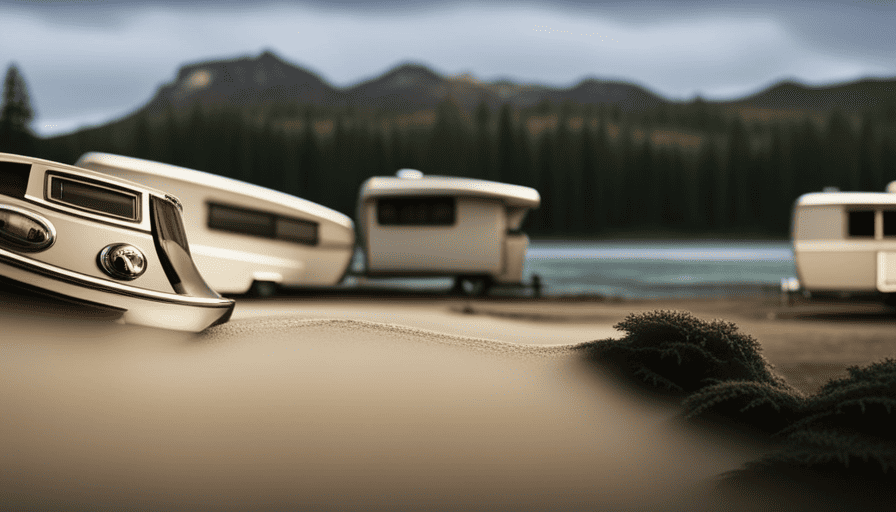
Did you know that over 70% of modern camping vehicles are equipped with slide outs? These innovative features have revolutionized the camping experience by providing extra living space at the push of a button.
In this article, I will explore the inner workings of camper slide outs and explain how they operate. Camper slide outs come in various types, including electric, hydraulic, and manual. Each type operates differently, but the goal remains the same – to extend the living area of the camper. These slide outs are powered by advanced technology, utilizing motors, gears, and control systems to smoothly extend and retract the sections.
Proper maintenance and care are essential to ensure the longevity of these slide outs. Regular inspections, lubrication, and cleaning are crucial to prevent malfunctions and extend their lifespan. Additionally, it is important to operate slide outs safely, following manufacturer guidelines and taking precautions to avoid accidents.
In this article, we will debunk common misconceptions about camper slide outs and discuss the latest innovations and future trends in this technology. So, let’s dive in and uncover the fascinating world of camper slide outs!
Key Takeaways
- Camper slide outs provide extra living space at the push of a button.
- Slide outs can be electric, hydraulic, or manual.
- Regular maintenance is necessary for the longevity of slide outs.
- Slide outs enhance comfort and functionality during camping trips.
Overview of Camper Slide Outs
So, let me explain how camper slide outs work and how they can transform your camping experience!
Camper slide outs are a popular feature in modern RVs, allowing you to expand the living space with just the push of a button. These slide outs are essentially additional sections of the camper that can be extended outwards, increasing the interior space.
One of the advantages of camper slide outs is the added room they provide. When extended, they create additional space for amenities such as a dining area, extra seating, or even a bedroom. This can greatly enhance the comfort and convenience of your camping trip.
However, it’s important to note that regular maintenance is crucial for the proper functioning of camper slide outs. This includes regular cleaning and lubrication of the slide out mechanism, as well as inspecting the seals and gaskets for any signs of wear or damage. By taking care of these maintenance tasks, you can ensure that your slide outs operate smoothly and efficiently.
Now, let’s move on to discussing the different types of camper slide outs and their unique features.
Types of Camper Slide Outs
There are various types of slide outs that allow campers to expand their living space. One type is the electric slide out, which operates using an electric motor to extend and retract the slide. This type of slide out is popular among campers due to its ease of use and convenience.
Another type is the hydraulic slide out, which utilizes hydraulic cylinders to move the slide in and out. This type of slide out provides a smooth and powerful operation, but it may require more maintenance compared to the electric slide out.
Additionally, there are also manual slide outs, which require manual effort to extend and retract the slide. These are typically found in smaller campers and may not offer as much convenience as the electric or hydraulic types.
Camper slide outs offer a number of benefits to campers. Firstly, they provide additional living space, allowing campers to have more room to move around and relax. This is especially useful during extended camping trips or when traveling with a larger group. Slide outs also enhance the overall comfort and functionality of the camper, making it feel more like a home away from home.
However, it is important to note that regular maintenance is required to ensure the proper functioning of slide outs. This includes lubricating the slide mechanisms, checking for any signs of wear or damage, and keeping the slide out clean and free from debris.
Transitioning to the subsequent section about the mechanisms behind camper slide outs, it is essential to understand how these mechanisms work in order to properly maintain and troubleshoot any issues that may arise.
Mechanisms Behind Camper Slide Outs
When it comes to the mechanisms behind camper slide outs, there are a few key systems to consider.
One common system is the gear-driven system, which uses gears and a motor to extend and retract the slide out.
Another option is the rack and pinion system, which uses a track and a gear to move the slide out in a straight line.
Lastly, there are hydraulic systems, which use hydraulic cylinders to push and pull the slide out.
Each system has its own advantages and considerations, so it’s important to understand how they work before choosing the right one for your camper.
Gear-driven Systems
To understand how camper slide outs work, picture yourself effortlessly extending the living space of your RV with the help of gear-driven systems. These mechanisms utilize gears to smoothly slide the walls of the camper in and out. Gear-driven slide outs offer several advantages over other systems.
-
Precise Control: The gear-driven mechanism allows for precise control of the slide out, ensuring smooth and accurate extension and retraction.
-
Stability: Gear-driven systems provide excellent stability, minimizing any wobbling or shaking when the slide out is in use.
-
Weight Capacity: These systems have a high weight capacity, allowing for larger slide outs and more spacious living areas.
-
Durability: Gear-driven mechanisms are known for their durability and longevity, ensuring that your slide outs will withstand years of use.
With an understanding of gear-driven systems, let’s now explore the next section on rack and pinion systems.
Rack and Pinion Systems
Imagine effortlessly expanding the boundaries of your RV, like a graceful dancer twirling across the stage, with the help of rack and pinion systems. These systems provide a reliable and efficient way of operating slide outs in campers.
One of the advantages of rack and pinion systems is their simplicity. They consist of a gear (the pinion) that engages with a long toothed track (the rack) attached to the slide out. As the gear rotates, it moves the slide out in and out smoothly. This design ensures a stable and precise movement, minimizing the risk of misalignment or jamming.
However, if you encounter any issues with your rack and pinion system, common troubleshooting steps involve checking for any obstructions or debris in the track, ensuring proper lubrication, and inspecting the gear teeth for any signs of wear.
Now, let’s delve into the world of hydraulic systems and discover their unique advantages.
Hydraulic Systems
The sheer power and efficiency of hydraulic systems can revolutionize the way you experience the freedom of your RV. In camper slide outs, hydraulic systems play a crucial role in extending and retracting the slide outs with ease.
These systems use hydraulic fluid, usually oil, to create pressure that is then controlled to move the slide out mechanism. The hydraulic fluid is stored in a reservoir and is pumped through hydraulic lines to the cylinder, which contains a piston. When pressure is applied to one side of the piston, it moves, extending or retracting the slide out.
Pressure control is essential in ensuring a smooth and controlled movement of the slide out. The amount of pressure applied determines the speed and force with which the slide out moves. This technology used in camper slide outs allows for convenient and efficient expansion of living space while on the road.
Technology Used in Camper Slide Outs
One way camper slide outs enhance the camping experience is by utilizing advanced technology. Slide out technology allows campers to expand the living space of their RVs, providing more room for activities and relaxation.
The technology used in camper slide outs includes electric motors, gears, and control systems. Electric motors are the main component of slide out technology. They’re responsible for extending and retracting the slide outs with the push of a button. These motors are designed to be powerful and efficient, ensuring smooth operation and minimizing energy consumption.
Gears play a crucial role in the movement of slide outs. They’re responsible for translating the rotational motion of the electric motors into linear motion, extending or retracting the slide outs accordingly. The gears used in slide outs are made of durable materials to withstand the heavy loads and constant movement.
Control systems are the brains behind camper slide outs. They allow users to operate the slide outs with ease and precision. Control panels are typically located inside the RV, allowing campers to extend or retract the slide outs from the comfort of their living space.
By utilizing advanced technology, camper slide outs provide numerous benefits, including increased living space, improved comfort, and enhanced functionality. Proper maintenance and care for camper slide outs are essential to ensure their longevity and optimal performance.
Maintenance and Care for Camper Slide Outs
When it comes to maintaining and caring for camper slide outs, there are several key points to keep in mind. First and foremost, lubrication and cleaning are essential for ensuring smooth operation.
Regular inspections are also crucial to catch any potential issues before they become major problems.
And finally, knowing how to troubleshoot common slide out issues can save you time and money in the long run. By following these steps, you can keep your camper slide outs in optimal condition and enjoy hassle-free camping experiences.
Lubrication and Cleaning
To keep your camper slide outs working smoothly, you’ll want to regularly lubricate and clean them, just like you would with a well-oiled machine. Imagine your slide outs as gears, turning and sliding effortlessly as you apply a generous amount of lubricant.
Here are three important steps to follow for proper lubrication maintenance and slide out operation:
-
Use a silicone-based lubricant: Silicone-based lubricants are recommended for camper slide outs as they provide excellent lubrication without attracting dirt or debris. Apply the lubricant to the slide out tracks, gears, and any other moving parts.
-
Clean the slide outs regularly: Dirt and debris can accumulate on the slide outs, hindering their smooth operation. Use a mild soap and water solution to clean the slide outs and remove any dirt or grime. Avoid using harsh chemicals that can damage the slide outs.
-
Inspect for any signs of wear or damage: While lubrication and cleaning are essential, it’s also important to regularly inspect the slide outs for any signs of wear or damage. Look for loose screws, cracks, or any unusual noises during operation. Address any issues promptly to prevent further damage.
By following these maintenance steps, you can ensure that your camper slide outs continue to operate smoothly. In the next section, we will discuss the importance of regular inspections to detect any potential issues early on.
Regular Inspections
After ensuring proper lubrication and cleaning of the camper slide outs, the next step is to perform regular inspections. This is a crucial part of camper maintenance to ensure the slide outs are functioning optimally and to catch any potential issues before they become major problems.
To conduct a thorough inspection, it’s important to have an inspection checklist handy. This checklist should include items such as checking for any signs of wear or damage on the slide out mechanism, examining the seals for any cracks or gaps, and inspecting the slide out floor for any soft spots or water damage.
By regularly inspecting your camper slide outs, you can identify and address any issues early on, preventing further damage and costly repairs. Moving on to troubleshooting common issues, let’s explore some common problems that may arise with camper slide outs.
Troubleshooting Common Issues
If you’re encountering any issues with your camper slide outs, troubleshooting common problems can help you quickly get back to enjoying your camping experience.
When it comes to troubleshooting electrical issues, the first step is to check the power source. Ensure that the camper is properly connected to a reliable power supply and that the circuit breaker is not tripped.
If the power source is not the problem, then you may need to inspect the wiring for any loose connections or damaged wires.
Additionally, if your slide outs are stuck and not moving, you can try manually retracting them using the crank or override system. This will allow you to safely bring them back in and address any underlying issues.
Transitioning to the next section, let’s now explore the pros and cons of camper slide outs.
Pros and Cons of Camper Slide Outs
When it comes to camper slide outs, there are several pros and cons to consider.
Firstly, slide outs provide increased living space, allowing for a more comfortable and spacious camping experience. However, it’s important to note that slide outs also come with the potential for mechanical failures, which can be costly and inconvenient to repair.
Additionally, it’s essential to consider the weight and towing considerations of camper slide outs, as they can add significant weight to the overall load and may require a more powerful towing vehicle.
Increased Living Space
To maximize your living space, camper slide outs utilize a clever mechanism that extends the walls outward, creating an expansive and comfortable interior. These slide outs are typically located on the sides of the camper and can be extended with the push of a button or the turn of a crank.
The increased living space provided by slide outs allows for a more open and spacious feel inside the camper, making it easier to move around and relax. Additionally, slide outs can provide increased privacy by separating different areas of the camper, such as the bedroom and the living room.
Furthermore, camper slide outs offer a wide range of design options, allowing owners to customize their living space to suit their preferences. However, it’s important to note that with the benefits of slide outs also comes the potential for mechanical failures, which can be addressed in the subsequent section.
Potential for Mechanical Failures
After discussing the increased living space that camper slide outs provide, it is important to acknowledge the potential for mechanical failures that can occur with these systems. While slide outs are designed to enhance comfort and convenience, they can also be susceptible to various issues that may hinder their functionality. To prevent mechanical failures, regular maintenance and inspection are crucial. This includes lubricating the slide out mechanism, checking for loose or damaged components, and ensuring proper alignment. Additionally, troubleshooting tips can be helpful in identifying and resolving common problems such as slide out misalignment or motor malfunctions. By following these preventative measures and addressing any issues promptly, campers can minimize the risk of experiencing mechanical failures with their slide outs. Moving forward, let’s delve into the important considerations related to weight and towing.
Weight and Towing Considerations
One thing to keep in mind is the weight and towing considerations when using camper slide outs. These considerations are essential to ensure a safe and smooth towing experience.
The weight of the slide outs can significantly impact the overall weight of the camper, which must be within the towing capacity of your vehicle. Exceeding the towing limitations can lead to structural damage, decreased stability, and increased fuel consumption. It’s crucial to consult the manufacturer’s guidelines and specifications to determine the maximum weight your vehicle can safely tow.
Additionally, the distribution of weight within the camper is important for towing stability. Uneven weight distribution caused by extended slide outs can affect the trailer’s balance and handling. It’s recommended to evenly distribute the weight and ensure that the load is properly secured.
Considering these weight and towing considerations will help you operate your camper slide outs safely and avoid any potential issues during your travels.
Tips for Operating Camper Slide Outs Safely
When operating camper slide outs, it’s important to follow certain safety measures to ensure a smooth and secure experience. First and foremost, I always make sure to level the camper before extending the slide outs. This helps to prevent any unnecessary stress on the slide out mechanism and ensures that the slide out will extend and retract properly.
Additionally, I take the time to clear the surrounding area of any obstacles that may obstruct the slide out’s path. This includes removing any furniture, loose items, or debris that could potentially get caught in the slide out mechanism.
Lastly, I always secure the slide out during travel by using the appropriate locks or braces provided by the manufacturer. This helps to prevent any accidental movement of the slide out while on the road, which could cause damage to both the slide out and the camper.
Leveling the Camper
Leveling the camper is essential for a smooth and comfortable camping experience, ensuring that every moment spent inside feels like a home away from home. To achieve proper leveling, there are various techniques and tools available.
One common leveling technique involves using leveling blocks or pads. These blocks can be placed under the wheels or stabilizing jacks to raise or lower the camper as needed.
Another popular method is using a leveling system, which automatically adjusts the camper’s height. These systems can be operated electronically or hydraulically, providing precise leveling with just the push of a button.
Additionally, some campers come equipped with built-in bubble levels to help determine if the camper is level.
Once the camper is leveled, it’s important to clear the surrounding area of any obstacles or debris, ensuring a safe and enjoyable camping experience.
Clearing the Surrounding Area
Clearing the surrounding area of any obstacles or debris ensures a safe and enjoyable camping experience, allowing campers to fully immerse themselves in the natural beauty of their surroundings. Before extending the slide outs, it is important to prepare the ground by removing any rocks, branches, or other debris that may interfere with the smooth operation of the slide outs. This not only prevents damage to the camper’s mechanism but also ensures a level platform for the slide outs to extend onto. To assist in this process, the following table provides a checklist of items to clear from the surrounding area:
| Clearing Debris Checklist |
|---|
| Rocks |
| Branches |
| Leaves |
| Trash |
| Other Obstacles |
Once the area is clear, campers can move on to the next step of securing the slide out during travel. This ensures that the slide outs remain in place and do not move while the camper is in motion.
Securing the Slide Out during Travel
To ensure a smooth and worry-free journey, it’s crucial that you properly secure the slide out before hitting the road. This will allow you to travel with peace of mind and enjoy the open road to its fullest.
Securing methods for slide outs vary depending on the specific camper model, but they typically involve using locks or latches to keep the slide out in place during travel. It’s important to follow the manufacturer’s instructions for securing the slide out, as improper securing can lead to damage or even the slide out coming loose while on the road.
Additionally, proper maintenance of the slide out is key to ensuring its stability during travel. Regularly inspecting the slide out for any signs of wear or damage and addressing any issues promptly is essential.
By taking these steps, you can confidently embark on your journey knowing that your slide out is securely in place.
Now, let’s address some common misconceptions about camper slide outs.
Common Misconceptions about Camper Slide Outs
When it comes to camper slide outs, there are several common misconceptions that I would like to clear up.
First, it is not true that slide outs always leak. While there’s a potential for leaks, proper maintenance and sealing can greatly reduce this risk.
Second, slide outs aren’t as fragile as some may believe. With proper care and understanding of their operation, slide outs can be durable and reliable.
Lastly, while there may be a learning curve, slide outs aren’t inherently difficult to use. With practice and following manufacturer instructions, operating slide outs can become second nature.
Slide Outs Always Leak
However, you may find that slide outs in campers often develop leaks due to the complex system of seals and gaskets that are susceptible to wear and tear over time. There are several potential causes for these leaks, including improper installation, poor maintenance, and exposure to extreme weather conditions.
To prevent leaks, it’s important to regularly inspect and maintain the seals and gaskets, ensuring they’re in good condition and properly aligned. Applying a silicone sealant or lubricant can also help to enhance the seals’ effectiveness. Additionally, keeping the slide out clean and free from debris can prevent damage to the seals.
It’s crucial to address any leaks promptly to prevent further damage to the camper’s interior.
Transitioning to the subsequent section about ‘slide outs are fragile,’ it’s important to understand the potential issues that can arise with these mechanisms.
Slide Outs are Fragile
Despite their convenience and added space, slide outs in campers can be surprisingly delicate and susceptible to damage, requiring careful handling. Fragility concerns arise due to the way slide outs are constructed and their impact on the overall structural integrity of the camper.
The slide out mechanism consists of multiple moving parts, such as gears, tracks, and hydraulic systems, all working together to extend and retract the slide out. These components are exposed to constant vibrations while the camper is in motion, increasing the risk of wear and tear. Additionally, the slide out walls are made of thinner materials compared to the main camper walls, making them more prone to damage.
Proper maintenance, regular inspections, and cautious operation are essential to minimize the risk of slide out damage and ensure their long-term functionality.
Transitioning into the subsequent section, slide outs are difficult to use without proper knowledge and practice.
Slide Outs are Difficult to Use
Moving on from the fragility of slide outs, let’s delve into the difficulties encountered when using them.
While slide outs can greatly expand the living space in a camper, they can also pose some challenges. One of the main difficulties is the learning curve involved in operating them. It may take some practice to master the proper sequence of steps needed to extend or retract the slide outs safely.
Additionally, slide outs require regular maintenance to ensure smooth operation, and failure to do so can result in malfunctions or even safety concerns. It’s important to be mindful of potential obstacles, such as low-hanging branches or uneven ground, which can impede the proper functioning of the slide outs.
Despite these challenges, manufacturers are constantly innovating and implementing new technologies to improve the usability and reliability of slide outs.
In the next section, we will explore some of these innovations and future trends in camper slide outs.
Innovations and Future Trends in Camper Slide Outs
Innovations and future trends in camper slide outs are centered around three key points: lightweight materials, automated slide out systems, and integrated smart technology.
Lightweight materials are being used to reduce the overall weight of slide outs, making them more efficient and easier to operate.
Automated slide out systems are being developed to streamline the process of extending and retracting slide outs, eliminating the need for manual labor.
Integrated smart technology is being incorporated into slide outs, allowing for remote control operation and advanced features such as automatic leveling and temperature control.
These advancements are revolutionizing the way camper slide outs work and are paving the way for a more convenient and efficient camping experience.
Lightweight Materials
To make camper slide outs lighter, you can use materials like aluminum or fiberglass. Lightweight construction is essential in order to increase fuel efficiency and improve overall mobility. Aluminum is a popular choice due to its high strength-to-weight ratio, corrosion resistance, and durability. Fiberglass, on the other hand, offers excellent insulation properties and is resistant to moisture and rot.
In terms of durability and strength, both materials have their advantages. Aluminum is known for its toughness and ability to withstand harsh weather conditions, while fiberglass is highly resistant to impact and can withstand extreme temperatures.
To illustrate the comparison between aluminum and fiberglass, consider the following table:
| Material | Weight (lbs) | Strength (psi) |
|---|---|---|
| Aluminum | 150 | 45,000 |
| Fiberglass | 120 | 35,000 |
These lightweight materials not only make camper slide outs more manageable, but also contribute to the overall longevity and reliability of the system. Moving forward, advancements in automated slide out systems will further enhance the convenience and efficiency of camper slide outs.
Automated Slide Out Systems
Imagine how much easier it is to extend and retract your camper’s slide outs with the convenience of automated systems. Automated slide out technology has revolutionized the camping experience, providing campers with a hassle-free way to expand their living space.
The benefits of automated slide out systems are numerous. Firstly, they save time and effort by eliminating the need to manually operate the slide outs. Secondly, they ensure precise alignment and smooth movement, preventing any potential damage to the camper or the slide out mechanism. Lastly, automated slide out systems offer enhanced safety features, such as sensors that detect obstacles and automatically stop the movement if something is in the way.
With these advanced features, campers can enjoy a seamless and stress-free camping experience. Transitioning into the subsequent section about integrated smart technology, let’s explore how these systems are becoming even more intelligent.
Integrated Smart Technology
With the integration of smart technology, campers can effortlessly control and enhance the functionality of their camping space. Integrated automation allows for seamless operation of the camper slide outs.
Through connectivity options such as Bluetooth or Wi-Fi, campers can easily extend or retract the slide outs with a simple touch of a button on their smartphone or tablet. The smart technology also provides real-time feedback on the position of the slide outs, ensuring precise and accurate control.
Additionally, advanced features like automatic leveling and synchronization of multiple slide outs are made possible through the integration of smart technology. This not only simplifies the setup process but also improves the overall camping experience.
With integrated smart technology, campers can enjoy the convenience and ease of controlling their slide outs, making their camping adventures more enjoyable and stress-free.
Moving on to the final thoughts on camper slide outs…
Final Thoughts on Camper Slide Outs
In conclusion, camper slide outs are a game-changer for maximizing space and comfort in your camping experience. As discussed earlier, slide outs have become increasingly popular due to their ability to create additional living space in an RV. Not only do they provide extra room for activities, but they also offer numerous benefits.
One of the key advantages of slide outs is the increased living area they provide. Whether it’s a dining area, bedroom, or even a full-sized kitchen, slide outs can significantly expand the usable space inside an RV. This allows for a more comfortable and enjoyable camping experience, especially when traveling with a large group or family.
Maintenance is a crucial aspect of keeping slide outs in good working condition. Regular inspections and lubrication of the slide mechanisms are essential to prevent any issues. Additionally, it’s important to keep the slide out seals clean and well-maintained to ensure a tight seal and prevent water leaks.
To summarize, camper slide outs offer numerous benefits to enhance your camping experience. From maximizing living space to providing additional comfort, they have revolutionized the way we camp. However, it’s important to stay on top of maintenance to ensure their proper functioning. By following these maintenance tips and taking care of your slide outs, you can enjoy the full benefits they offer for years to come.
| Maintenance Tips | Benefits of Slide Outs | Importance of Regular Inspections |
|---|---|---|
| Lubricate slide mechanisms regularly | Increased living area | Preventing issues |
| Keep slide out seals clean | Comfort and enjoyment | Tight seal to prevent water leaks |
| Regularly inspect slide out mechanisms | Enhanced camping experience | Ensuring proper functioning |
Frequently Asked Questions
Are camper slide outs only available in certain types of RVs?
Camper slide outs are available in various types of RVs, ranging from travel trailers to motorhomes. These innovative features provide numerous benefits for RV enthusiasts. Not only do slide outs increase living space, but they also enhance comfort and convenience on the road.
By expanding the interior, slide outs allow for larger sleeping areas, spacious kitchens, and more room for relaxing and entertaining. Overall, camper slide outs greatly improve the overall functionality and enjoyment of RV living.
How long does it typically take to extend or retract a camper slide out?
Extending or retracting a camper slide out can typically take anywhere from 30 seconds to a few minutes, depending on the size and design of the slide out mechanism. I once witnessed a slide out being extended on an RV, and it was like watching a graceful ballet. The motorized system smoothly extended the slide out, revealing a spacious living area.
As for the average cost of adding a slide out to an existing RV, it can range from $5,000 to $20,000, depending on various factors such as size, materials, and customization options.
Can camper slide outs be operated manually in case of a power failure?
Yes, camper slide outs can be operated manually in case of a power failure. To manually extend or retract a slide out, locate the manual override system, usually a crank or lever, typically located near the slide out mechanism. Insert the tool into the override system and turn it clockwise to retract the slide out or counterclockwise to extend it. It’s important to follow all safety precautions and guidelines provided by the manufacturer to prevent any accidents or damage.
Is it possible to add a slide out to an existing RV that does not have one?
Adding slide outs to an existing RV can be a great way to increase living space and enhance comfort. However, there are several pros and cons to consider.
On the positive side, slide outs provide additional room for amenities like beds, seating areas, and kitchen appliances. However, they also can add weight and affect the balance and stability of the RV.
Costs for adding slide outs vary depending on the size and complexity of the project, but it’s important to factor in expenses such as structural modifications, electrical and plumbing work, and potential loss of storage space.
What are some common problems or issues that can arise with camper slide outs?
Slide outs can encounter a range of common problems, such as motor failures, electrical issues, or misalignment. Motor failures can be caused by wear and tear or lack of maintenance.
Electrical problems may stem from faulty wiring or blown fuses.
Misalignment can occur due to excessive weight or improper operation.
To troubleshoot these issues, it’s important to check the motor, electrical connections, and alignment. Regular maintenance and proper operation can help prevent these problems.
Conclusion
In conclusion, camper slide outs are a remarkable innovation in the world of camping. They offer increased living space and comfort while on the road, making camping experiences more enjoyable.
From hydraulic systems to electric motors, the mechanisms behind slide outs are complex yet efficient. Regular maintenance and care are essential to ensure their proper functionality. By following safety precautions and understanding the technology used, camper slide outs can be operated safely.
As advancements continue to be made, we can expect even more innovative features and designs in the future. So, get ready to slide out and explore the great outdoors in style!
Jason is the author of Laienhaft, a blog for all things outdoor and camping. If you’re looking for the best tent to take on your next camping trip, or need some advice on how to get started with recreational camping, Jason has you covered. He’s also an expert on survival skills – if you’re ever lost in the wilderness, he’s the guy you want to find!
Beginners Guides
How To Measure Camper Length
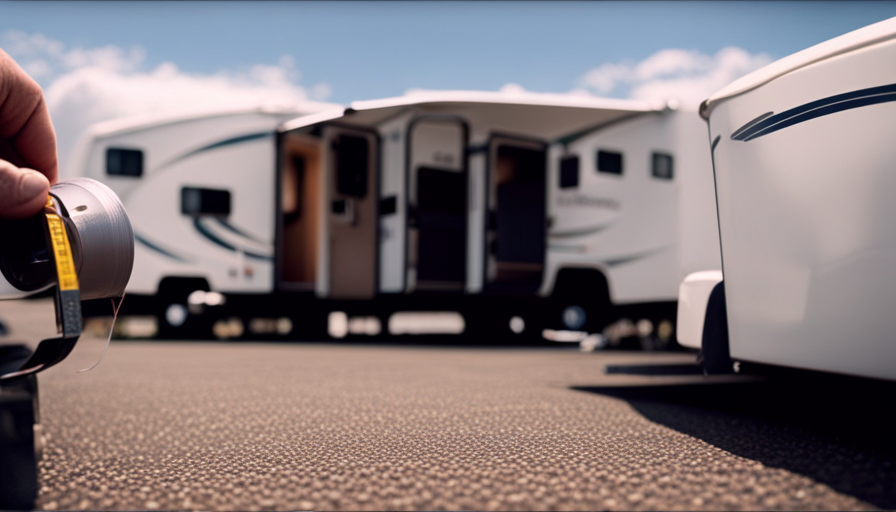
The size of a camper, similar to the winding road ahead, can sometimes be a challenge to measure. But fear not, adventurers! I am here to help as your trusty guide, excited to unveil the secrets of measuring a camper’s length.
Picture this: you’re embarking on a thrilling camping trip, and you need to determine the size of your faithful companion, your camper. Whether you’re looking to upgrade your rig or simply find the perfect campsite, accurate measurements are your compass in this vast world of camping.
So, grab your measuring tape and let’s dive in! In this article, I’ll walk you through the step-by-step process of measuring camper length, from gathering the necessary tools to recording and double-checking your measurements. Together, we’ll unlock the key to selecting the ideal campsite and ensure a smooth and delightful camping experience.
So, my fellow explorers, let’s embark on this journey of measurement mastery!
Key Takeaways
- Accurate measurements of a camper’s length are important for various reasons, including choosing the right campsite and accessories, ensuring proper navigation and weight distribution.
- The tools needed to measure camper length include a tape measure, notepad, pen, and a ladder.
- To measure the length of a camper, start at the front edge and measure the exterior length from front to back, including any protruding parts. Then, measure the interior length by removing obstacles and measuring from the back to the front wall. Consider the width and height of the interior space as well.
- When measuring attachments such as awnings or bike racks, measure them in their fully extended or maximum position as they can affect the overall length of the camper.
Importance of Measuring Camper Length
You should understand the importance of measuring the length of your camper to ensure proper fit and avoid any potential issues. Accurate measurements are crucial when it comes to finding the right size for your camper.
Knowing the exact length of your camper has several benefits. Firstly, it allows you to choose the appropriate campsite or parking space. Some campsites have size restrictions, and knowing your camper’s length ensures that you won’t encounter any unexpected limitations.
Secondly, accurate measurements help you select the right accessories and equipment for your camper. Whether it’s a cover, awning, or bike rack, knowing the length of your camper ensures a perfect fit and avoids wasted time and money.
Additionally, understanding the length of your camper helps with navigation and maneuvering. It allows you to plan your route effectively, avoiding low bridges or narrow roads.
Lastly, accurate measurements contribute to the overall safety and stability of your camper. By knowing its length, you can distribute weight evenly and avoid any imbalance issues.
So, now that you understand the importance of accurate measurements, let’s move on to the next step: gathering the necessary tools.
Gather the Necessary Tools
Grab your trusty tape measure and prepare to embark on a journey of discovery as you delve into the world of quantifying the dimensions of your beloved home on wheels. When it comes to measuring the length of your camper, accuracy is key. A slight miscalculation can result in costly mistakes when it comes to parking or fitting your camper into storage spaces.
To ensure precise measurements, gather the necessary tools for the job. Here are a few items you’ll need:
- A tape measure with both metric and imperial units for versatility.
- A notepad and pen to jot down measurements for reference.
- A sturdy step ladder to reach the higher points of your camper.
Now that you have the tools at your disposal, it’s important to emphasize the significance of accuracy. Even the smallest measurement mistake can lead to difficulties down the road. It’s common for people to overlook small details or make assumptions, resulting in inaccurate measurements. By taking the time to measure your camper correctly, you can avoid unnecessary hassles and ensure a smooth journey.
With the tools in hand and the importance of accuracy in mind, it’s time to move on to the next step: locating the starting point for measurement.
Locate the Starting Point
Before embarking on the journey of accurately quantifying the dimensions of your mobile home, it’s crucial to locate the starting point for measurement, setting the foundation for a meticulous assessment. To ensure accuracy, it is important to use a measuring tape and a level to guarantee precise measurements. Here is a handy table to help guide you through the process:
| Tool | Purpose |
|---|---|
| Measuring tape | Determines length accurately |
| Level | Ensures a straight and level starting point |
To locate the starting point, position yourself at the front of the camper. Place the measuring tape at the very front edge, ensuring it is flush against the wall. Extend the tape along the entire length of the camper until you reach the end. Take note of the measurement and mark it as the starting point.
By using this measuring technique, you can establish an accurate starting point for measuring the exterior length of your camper. This will provide a solid foundation for the subsequent section on how to measure the exterior length without missing any crucial details.
Measure the Exterior Length
Start by using a measuring tape and level to accurately determine the dimensions of your mobile home, ensuring a straight and level starting point. Did you know that the average exterior length of a mobile home is around 60 feet?
To measure the exterior length of your camper, begin at the front of the trailer and extend the measuring tape all the way to the back. Make sure to measure from the outermost points, including any protruding parts like bumpers or hitches. This will give you an accurate measurement of the overall length of your camper.
Knowing the exterior length of your camper is essential when considering parking and storage options. It will help you determine whether your mobile home will fit in a designated space or if you need to make any adjustments. Additionally, understanding the exterior length can give you an idea of the interior space and storage capacity of your camper.
Next, we will move on to measuring the interior length of your mobile home. By accurately measuring both the exterior and interior dimensions, you will have a comprehensive understanding of the size and layout of your camper, allowing you to make informed decisions when it comes to planning your camping adventures.
Measure the Interior Length
Once you’ve determined the exterior dimensions of your mobile home, it’s time to explore the spacious interior and uncover the true length of your camper.
To accurately measure the interior length, you’ll need to utilize specific measuring techniques and take into account the overall dimensions of the living space.
Start by removing any furniture or belongings that might obstruct your measurements. Use a tape measure to measure the distance from the back wall to the front wall of the camper. Make sure to measure from the inside of the walls to get an accurate measurement.
Additionally, measure the width and height of the interior space to capture a complete understanding of the dimensions. Take note of any irregularities or protrusions, such as cabinets or appliances, that may affect the measurements.
Once you have gathered all the necessary measurements, you can confidently determine the interior length of your camper. With this information, you can now consider any additional attachments that may extend the overall length of your camper, such as awnings or bike racks.
Consider Any Additional Attachments
When it comes to measuring the interior length of a camper, there are a few things you need to consider. In my experience, it’s important to take into account any additional attachments that may affect the overall length. These attachments could include things like awnings, bike racks, or spare tire carriers. They can add a few extra feet to the camper’s length, so it’s crucial to measure with them in mind.
To ensure measuring accuracy, I recommend taking the measurements with the attachments fully extended or in their maximum position. This will give you the most accurate measurement of the camper’s total length.
When measuring, it’s also helpful to use a nested bullet point list to keep track of the different measurements and attachments:
-
Measure the interior length of the camper without any attachments
-
Extend or position the attachments to their maximum length
-
Measure the additional length added by each attachment
By following these steps and considering any additional attachments, you can ensure that your measurements are precise and accurate. This is crucial when it comes to planning for storage or determining if the camper will fit in a specific space.
Now that we’ve measured the interior length and considered any additional attachments, it’s time to record and double-check the measurements.
Record and Double-Check the Measurements
To ensure absolute precision, make sure to jot down and meticulously cross-reference the measurements you’ve taken, capturing every minute detail that will determine the perfect fit for your camper. Double-checking measurements is essential to avoid common measurement mistakes that could lead to an ill-fitting camper.
One common mistake is failing to record measurements accurately, which can result in a camper that is too big or too small for your needs. Another mistake is not double-checking the measurements against the camper’s specifications, which can lead to costly errors.
It’s also important to consider any additional attachments you may have on your camper, such as awnings or bike racks, and factor those into your measurements.
By taking the time to double-check your measurements and consider all attachments, you can ensure that your camper will fit perfectly at any campsite you choose. This will allow you to make the most of your camping experience without any unexpected surprises.
Use the Measurements for Campsite Selection
Now that you have the precise measurements, you can easily find the perfect campsite that will accommodate your camper without any surprises. It’s important to consider the campsite amenities and campground regulations when making your selection.
Start by looking for campsites that offer the amenities you need, such as electrical hookups, water connections, and dump stations. Some campgrounds even have amenities like swimming pools, playgrounds, and laundry facilities.
Make sure to check if there are any restrictions on camper length or vehicle size at the campsite you’re considering. This will ensure that your camper fits within the designated space and that you won’t be turned away upon arrival.
Additionally, familiarize yourself with any campground regulations regarding noise levels, pet policies, and quiet hours to ensure a peaceful and enjoyable camping experience.
By considering these factors, you can find a campsite that meets your needs and provides a comfortable stay for you and your camper.
Now, let’s move on to some tips for choosing the right campsite.
Tips for Choosing the Right Campsite
Discover your perfect campsite by following these tips and create memories that will last a lifetime. When choosing a campsite location, there are a few key factors to consider. First, think about the amenities that are important to you. Are you looking for a campsite with electricity and running water, or are you more interested in a secluded spot off the beaten path? Consider what facilities are available at each campsite and choose one that meets your needs.
To help you make a decision, here is a handy table that compares different campsites based on their amenities:
| Campsite | Electricity | Running Water | Picnic Tables | Restrooms |
|---|---|---|---|---|
| Campsite A | Yes | Yes | Yes | Yes |
| Campsite B | No | Yes | No | Yes |
| Campsite C | Yes | No | Yes | No |
| Campsite D | No | No | No | No |
By comparing the amenities offered at each campsite, you can easily find the one that suits your preferences. Once you have chosen the perfect campsite, you can focus on enjoying a smooth camping experience.
Enjoy a Smooth Camping Experience
Having a hassle-free camping experience is possible with proper planning and preparation. When it comes to enjoying a smooth camping experience, having the right camping gear is essential. Make sure to check your camping equipment before heading out, ensuring that everything’s in good working condition. This includes your tent, sleeping bags, cooking utensils, and any other gear you might need.
Another important aspect of a smooth camping experience is campfire safety. Before starting a campfire, check the rules and regulations of the campsite regarding fire safety. Always choose a designated fire pit and clear the area around it from any flammable materials. Keep a bucket of water nearby and never leave the fire unattended. It’s also important to fully extinguish the fire before leaving the campsite or going to sleep.
In addition to these tips, it’s helpful to have a camping checklist to ensure you’ve got everything you need. This’ll help you avoid forgetting any essential items and make your camping experience more enjoyable. Lastly, don’t forget to pack some entertainment options like board games or a deck of cards to keep yourself and your fellow campers entertained during downtime.
With these tips in mind, you’ll be well-prepared for a smooth and enjoyable camping experience.
Frequently Asked Questions
How do I measure the height of my camper?
To measure the height of your camper, start by finding a level surface and park your camper on it. Use a measuring tape to measure from the ground to the highest point of your camper’s roof. It’s important to note that different types of campers may require different measuring techniques. For example, pop-up campers may need to be fully extended before measuring. Knowing how to measure camper width is also crucial for a complete understanding of your camper’s dimensions.
Can I measure the camper length by using a tape measure alone?
Yes, you can measure the camper length using a tape measure alone. To determine the camper size accurately, start by extending the tape measure from the front to the rear of the camper, measuring from the outermost points. Make sure to include any additional length from attachments like bumpers or spare tires.
By measuring the camper width as well, you can get a comprehensive understanding of its dimensions and make informed decisions when it comes to storage or transportation.
Should I include the hitch in the camper length measurement?
Yes, it’s essential to include the hitch in the camper length measurement. The hitch weight plays a crucial role in how the camper handles during travel. By accurately measuring the entire length of the camper, including the hitch, you can determine the weight distribution and ensure safe towing.
Accurate measurements are vital for determining the hitch weight and ensuring that your camper is properly balanced and secure on the road.
Are there any specific tools or techniques to measure the interior length accurately?
To measure the interior length of a camper accurately, I suggest using a tape measure and a straightedge. Start by removing any obstructions, such as furniture or curtains, to get an unobstructed measurement.
Place the tape measure at one end of the interior and extend it to the other, following the contours of the walls. Make sure to measure both the widest and narrowest points to get an accurate understanding of the camper’s width.
This technique ensures precise measurements for determining the interior length of your camper.
What are some common mistakes people make when measuring their camper length?
Common misconceptions about camper length measurement often stem from not taking into account certain factors.
One common mistake is not considering the protrusions, such as awnings or bike racks, that may add to the overall length.
Another mistake is not properly measuring the tongue or hitch, which can significantly impact the total length.
To accurately measure the length of a camper, it’s important to take these factors into consideration and use a measuring tape to get precise measurements.
Conclusion
In conclusion, accurately measuring your camper length is crucial for a seamless camping adventure. By gathering the necessary tools, locating the starting point, and measuring both the exterior and interior length, you can ensure precise measurements.
Recording and double-checking these measurements will further guarantee accuracy. Utilizing these measurements for campsite selection will allow you to find the perfect spot for your camper. Remember to consider tips for choosing the right campsite to enhance your overall experience.
So, start measuring and embark on a marvelous camping journey!
Jason is the author of Laienhaft, a blog for all things outdoor and camping. If you’re looking for the best tent to take on your next camping trip, or need some advice on how to get started with recreational camping, Jason has you covered. He’s also an expert on survival skills – if you’re ever lost in the wilderness, he’s the guy you want to find!
Beginners Guides
How To Move A 5th Wheel Camper With A Tractor
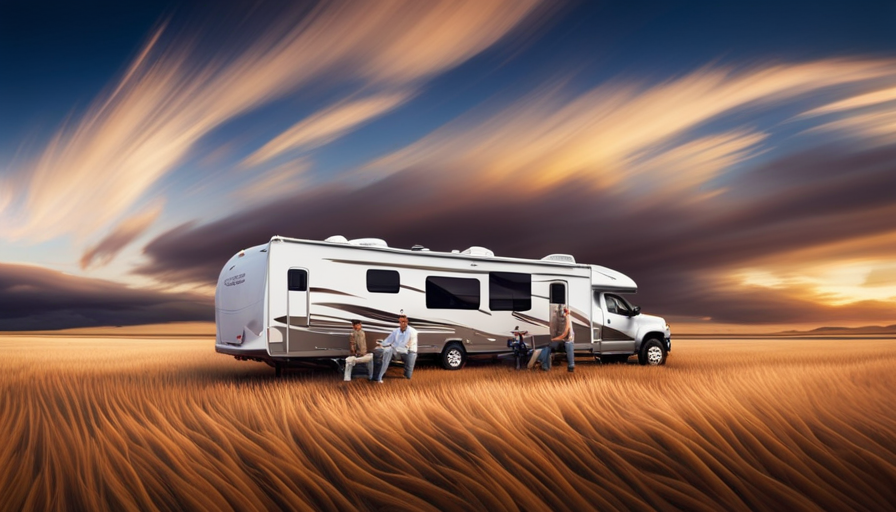
Transporting a 5th wheel camper with a tractor can be challenging, similar to herding cats, but with the right knowledge and preparation, it can be done smoothly. Like a conductor guiding an orchestra, I am here to provide a comprehensive guide on safely and efficiently moving your 5th wheel camper with a tractor.
From assessing your tractor’s capabilities to properly hitching and connecting the camper, securing it for transportation, and maneuvering with precision, I will walk you through each crucial aspect of the process.
We will cover everything from checking the connection and brakes to driving slowly and steadily, taking breaks, and following safety regulations.
By the end of this article, you’ll be ready to tackle the challenge of moving your 5th wheel camper with confidence and ease.
Key Takeaways
- Assess tractor’s capabilities and attachments for towing stability and control.
- Use a hitch specifically designed for 5th wheel campers for secure and stable connection.
- Practice in an open area to improve maneuverability skills.
- Plan the route and consider obstacles before starting the journey.
Assess Your Tractor’s Capabilities and Attachments
Before you can begin moving a 5th wheel camper with a tractor, it’s important to assess your tractor’s capabilities and attachments.
This step is crucial to ensure that your tractor is suitable for the task and has the necessary equipment to safely move the camper.
Firstly, you need to consider the tractor attachments. A 3-point hitch is commonly used for connecting and towing trailers, including 5th wheel campers. It provides stability and control while towing, making it an essential attachment for this task. Additionally, a power take-off (PTO) is required for the hydraulic system that operates the trailer’s landing gear and brakes. This attachment allows you to control the movement and stability of the camper during transportation.
Secondly, you should evaluate the tractor’s capabilities. Check the towing capacity of your tractor and make sure it’s sufficient to handle the weight of the 5th wheel camper. The tractor should have enough power to move the camper smoothly and safely, especially when navigating inclines or rough terrain.
By assessing your tractor’s attachments and capabilities, you can ensure that it’s equipped to handle the task of moving a 5th wheel camper. Once you’ve confirmed this, you can proceed to the next step and ensure proper hitching and connection for a successful towing experience.
Ensure Proper Hitching and Connection
Securely shackled and snugly fastened, swiftly sync the hitch and connector for smooth and seamless towing. Before connecting your 5th wheel camper to the tractor, it is crucial to follow a hitching checklist to ensure all necessary safety measures are taken. This will help avoid common mistakes that others have experienced when hitching and connecting their camper.
To provide a visual representation of the hitching process, refer to the table below:
| Hitching Checklist | Common Mistakes to Avoid |
|---|---|
| Inspect the hitch and connector for any damage or wear | Failing to properly align the hitch and connector |
| Double-check that safety chains are securely attached | Forgetting to lock the hitch in place |
| Ensure the electrical connection is properly plugged in | Neglecting to check the brake and signal lights |
| Confirm that the weight distribution system is correctly set up | Overlooking the proper adjustment of the hitch height |
| Test the trailer brakes to ensure they are functioning correctly | Failing to tighten all connection points |
By following these guidelines and avoiding common mistakes, you can safely hitch and connect your 5th wheel camper to the tractor. Once the hitching and connection process is complete, you can move on to securing your camper for transportation.
Transitioning into the subsequent section, let’s explore how to secure your 5th wheel camper for transportation without compromising its stability and safety.
Secure Your 5th Wheel Camper for Transportation
To ensure a smooth and enjoyable journey, make sure your 5th wheel camper is securely prepared for transportation.
Choosing the right hitching equipment is crucial to ensure a safe connection between your tractor and the camper. Make sure to use a hitch specifically designed for 5th wheel campers, as it provides a secure and stable connection. Additionally, ensure the hitch is properly installed and tightened according to the manufacturer’s instructions.
Once the hitch is properly connected, it’s important to secure delicate items inside the camper. This will prevent them from shifting or getting damaged during transportation. Use bungee cords, straps, or cargo nets to secure loose items such as dishes, glasses, and electronics. Also, consider using foam padding or blankets to protect fragile items from bumps and vibrations.
By choosing the right hitching equipment and securing delicate items inside the camper, you can ensure a safe and smooth journey. However, before hitting the road, it’s essential to test the connection and brakes to ensure everything is functioning properly. This will help you identify any issues and make adjustments if necessary, ensuring a worry-free trip.
Test the Connection and Brakes
Ensure a smooth and worry-free journey by conducting a thorough test of the connection and brakes between your vehicle and the 5th wheel camper. Here are three key steps to follow when testing the connection and brakes before hitting the road:
-
Testing Brake Effectiveness: Start by checking the brake controller on your tractor. Adjust it to ensure that the brakes engage smoothly when you apply pressure. Next, hook up the 5th wheel camper and drive slowly while applying the brakes. Pay close attention to any unusual noises or vibrations, as these could indicate issues with the brake system. Additionally, make sure the brakes are evenly distributed between the tractor and the camper to ensure safe and effective stopping power.
-
Checking Electrical Connections: Proper electrical connections are crucial for the functioning of your 5th wheel camper’s lights, turn signals, and brake lights. Inspect the electrical plug on both the tractor and the camper for any signs of damage or corrosion. Ensure that all the connectors are securely fastened and that the wires aren’t frayed or exposed. Test all the lights and signals to verify that they’re working correctly.
-
Transition: Once you’ve tested the connection and brakes, it’s time to practice maneuvering and turning with your tractor. This’ll help you become familiar with the handling and dynamics of your setup, ensuring a safe and confident driving experience.
Practice Maneuvering and Turning with Your Tractor
Get ready to feel the thrill of maneuvering and turning your powerful rig as you become one with the road. When it comes to moving a 5th wheel camper with a tractor, mastering your maneuverability skills is crucial. Here are some tips to help you improve your tractor maneuverability skills and overcome common challenges.
First and foremost, it’s essential to practice in an open area with no obstacles. This will allow you to get a feel for the tractor’s turning radius and how it handles when maneuvering. Start by making gentle turns and gradually increase the difficulty as you become more comfortable. Remember to use your mirrors and keep a close eye on the trailer’s position to avoid any mishaps.
One common challenge when maneuvering a 5th wheel camper with a tractor is dealing with tight spaces. To overcome this, take it slow and steady. Use small, controlled movements to inch your way into the desired spot. Don’t be afraid to make minor adjustments as needed.
Another challenge is backing up. It can be tricky to navigate the trailer’s path accurately. Take your time and use your mirrors to guide you. If possible, have someone outside the tractor to help direct you.
By practicing these tips, you’ll improve your tractor maneuverability skills and be better prepared to handle the challenges that come with moving a 5th wheel camper. Now, let’s move on to the next step: planning your route and considering any obstacles that may lie ahead.
Plan Your Route and Consider Any Obstacles
Before you embark on your journey, imagine the thrill of navigating through a carefully planned route, anticipating and triumphing over any unforeseen obstacles that may stand in your way. When it comes to moving a 5th wheel camper with a tractor, planning your route and considering any obstacles is crucial for a successful journey.
One important consideration is navigating narrow roads. Before hitting the road, make sure to research and map out the route, taking note of any narrow or winding roads. These roads may require extra caution and maneuvering skills to ensure a safe passage for your camper and tractor. It’s also a good idea to check for any weight restrictions or height limitations along your route.
Tips for crossing bridges and going up/down hills are also essential. When approaching a bridge, be mindful of weight limits and ensure that your camper and tractor fall within those limits. Going up or down hills requires careful acceleration and deceleration to maintain control and prevent any potential accidents.
As you plan your route and consider potential obstacles, remember to drive slowly and steadily while transporting the camper. This will help maintain stability and reduce the risk of accidents or damage. With these considerations in mind, you’ll be well-prepared to tackle the road ahead and safely transport your 5th wheel camper with a tractor.
Drive Slowly and Steadily While Transporting the Camper
Take your time and maintain a steady pace as you cruise along the road, feeling the thrill of transporting your enormous home on wheels with the power of a mighty tractor. When driving a 5th wheel camper, it’s important to be prepared for various road conditions, especially when dealing with uneven terrain.
To navigate this type of terrain, it’s crucial to slow down and take extra caution. Keep a firm grip on the steering wheel and avoid sudden movements that could cause the camper to sway. Additionally, be mindful of any potential obstacles, such as potholes or rocks, and maneuver around them carefully.
Another challenge you may encounter while towing a camper is windy conditions. Strong gusts of wind can affect the stability of your vehicle and make it harder to control. To handle this, reduce your speed and keep both hands on the wheel, ensuring a firm grip. This’ll help you maintain control and prevent your camper from swaying excessively. If the wind becomes too intense, consider pulling over to a safe location and waiting until the conditions improve.
As you continue your journey, remember to take breaks and check the camper’s condition regularly. This’ll ensure that everything’s in proper working order and prevent any potential issues.
Take Breaks and Check the Camper’s Condition Regularly
Remember to periodically stop and inspect your home on wheels to ensure it’s in top-notch condition, providing you with peace of mind and a worry-free journey. Regular maintenance is crucial to keep your 5th wheel camper in optimal condition. Here are some safety precautions to consider and steps to take during your breaks:
-
Check the tires: Examine the tire pressure and look for any signs of wear or damage. Replace any worn-out tires to prevent blowouts during your travels.
-
Inspect the hitch: Ensure that the hitch is securely attached to the tractor and the camper. Look for any loose bolts or signs of damage. Lubricate the hitch regularly to maintain smooth operation.
-
Test the brakes and lights: Activate the brakes and lights to ensure they’re functioning correctly. Replace any faulty bulbs or worn-out brake pads to ensure optimal safety on the road.
-
Examine the interior: Take a quick look inside the camper to ensure everything’s in place. Check for any loose furniture, leaks, or electrical issues that may need attention.
By following these regular maintenance steps and safety precautions, you can ensure a safe and trouble-free journey with your 5th wheel camper.
Now, let’s move on to the next step of properly parking and disconnecting the camper at your destination.
Properly Park and Disconnect the Camper at Your Destination
Once you’ve arrived at your destination, it’s essential to skillfully park and disconnect your 5th wheel camper for a hassle-free experience.
Maximizing space utilization is crucial to ensure you have enough room to comfortably maneuver your camper. When parking, look for a level surface that will provide stability and prevent any unwanted shifting. It’s recommended to use leveling blocks or ramps to achieve a balanced position.
Adjust the front landing gear to level the camper from side to side and front to back, ensuring that all tires are firmly on the ground.
Next, disconnect the camper from the tractor. Start by lowering the front landing gear to take the weight off the hitch. Then, release the hitch lock and carefully raise the tractor’s coupling device. Slowly drive the tractor forward until the hitch is completely clear. Double-check that the camper is secure and stable before moving on to the next steps.
To finalize the process, it’s crucial to follow safety guidelines and regulations for moving trailers with tractors. This includes using safety chains, properly attaching electrical connections, and ensuring all lights are functioning correctly. By adhering to these guidelines, you can have peace of mind while towing your 5th wheel camper.
Follow Safety Guidelines and Regulations for Moving Trailers with Tractors
After properly parking and disconnecting your camper at your destination, it’s important to ensure that you follow safety guidelines and regulations when moving trailers with tractors. Tractor safety is crucial to prevent accidents and ensure a successful towing experience.
First and foremost, always inspect your tractor before hooking up the camper. Check the tires, brakes, lights, and hitch to ensure they’re in good working condition. It’s also essential to make sure that your tractor is properly rated to tow the weight of your camper.
When it comes to trailer regulations, each state may have specific requirements regarding trailer towing. Familiarize yourself with these regulations, including speed limits, licensing, and any additional equipment that may be required. It’s also important to properly distribute the weight of your camper to prevent swaying or instability during transport.
During the towing process, maintain a safe distance from other vehicles and drive at a moderate speed. Be cautious of turns, especially when maneuvering in tight spaces. Always use your turn signals and check your mirrors frequently to ensure you have clear visibility.
By following these safety guidelines and adhering to trailer regulations, you can confidently move your 5th wheel camper with a tractor, ensuring a safe and enjoyable journey.
Frequently Asked Questions
Are there any specific weight limits or restrictions for moving a 5th wheel camper with a tractor?
Weight limits and tractor restrictions are crucial when it comes to moving a 5th wheel camper. It’s important to ensure that the tractor you’re using can handle the weight of the camper safely. Exceeding weight limits can lead to accidents or damage to both the tractor and the camper.
Additionally, tractor restrictions such as towing capacity and hitch compatibility should be taken into consideration to ensure a smooth and secure towing experience. As the saying goes, "Don’t bite off more than you can chew."
What type of hitch or attachment is recommended for moving a 5th wheel camper with a tractor?
To move a 5th wheel camper with a tractor, the recommended type of tractor attachment is a 5th wheel hitch. This hitch is specifically designed to handle the weight and unique towing requirements of a 5th wheel camper. It offers a secure and stable connection between the camper and the tractor, ensuring safe and efficient transportation.
The advantages of using a tractor for this task include its power and towing capacity, allowing for easier maneuverability and control while moving the camper.
How do I properly secure the 5th wheel camper for transportation?
To properly secure a 5th wheel camper for transportation, there are a few essential steps to follow.
First, make sure to use sturdy wheel chocks to prevent any movement.
Next, attach safety chains to the tractor and camper, ensuring they’re properly secured.
Additionally, use a kingpin lock for added stability.
It’s also important to check that all windows and doors are securely closed.
Lastly, double-check that the hitch is properly connected and locked in place.
These steps, along with the necessary tools and equipment, will ensure a safe and secure journey for your 5th wheel camper.
What should I do if I experience any issues with the connection or brakes while moving the camper?
If I experience any issues with the connection or brakes while moving the camper, it’s important to troubleshoot the connection issues immediately.
I would start by checking the hitch and ensuring it’s properly secured to the tractor. If there are any loose connections, I would tighten them right away.
In the event of brake failures, I would safely pull over and assess the situation. It may be necessary to contact a professional for assistance or repair.
Are there any specific safety regulations or guidelines I should be aware of when moving a trailer with a tractor?
Alright folks, let’s dive into the nitty-gritty of moving a trailer with a tractor! Safety is key here, so proper maintenance of both the tractor and the trailer is absolutely crucial.
Regular check-ups and inspections will ensure everything’s in tip-top shape. Now, when it comes to navigating turns and inclines, take ’em nice and slow. Give yourself plenty of room and use caution. Remember, it’s better to be safe than sorry!
Can I Move a 5th Wheel Camper Without a Hitch Using a Tractor?
Moving a 5th wheel camper smoothly without a hitch using a tractor poses significant challenges. A tractor lacks the necessary hitch system specifically designed for towing a 5th wheel. This method can cause damage to both the camper and tractor, compromising safety. To ensure a safe and secure journey, it is essential to use a compatible hitch specifically designed for towing 5th wheel campers.
Conclusion
In conclusion, moving a 5th wheel camper with a tractor requires careful planning and attention to detail. By assessing your tractor’s capabilities and ensuring proper hitching and connection, you can ensure a safe and successful journey.
It’s important to secure the camper for transportation, test the connection and brakes, and practice maneuvering and turning with your tractor. Remember to drive slowly and steadily, taking breaks to check the camper’s condition.
Finally, properly park and disconnect the camper at your destination, following all safety guidelines and regulations.
Jason is the author of Laienhaft, a blog for all things outdoor and camping. If you’re looking for the best tent to take on your next camping trip, or need some advice on how to get started with recreational camping, Jason has you covered. He’s also an expert on survival skills – if you’re ever lost in the wilderness, he’s the guy you want to find!
-
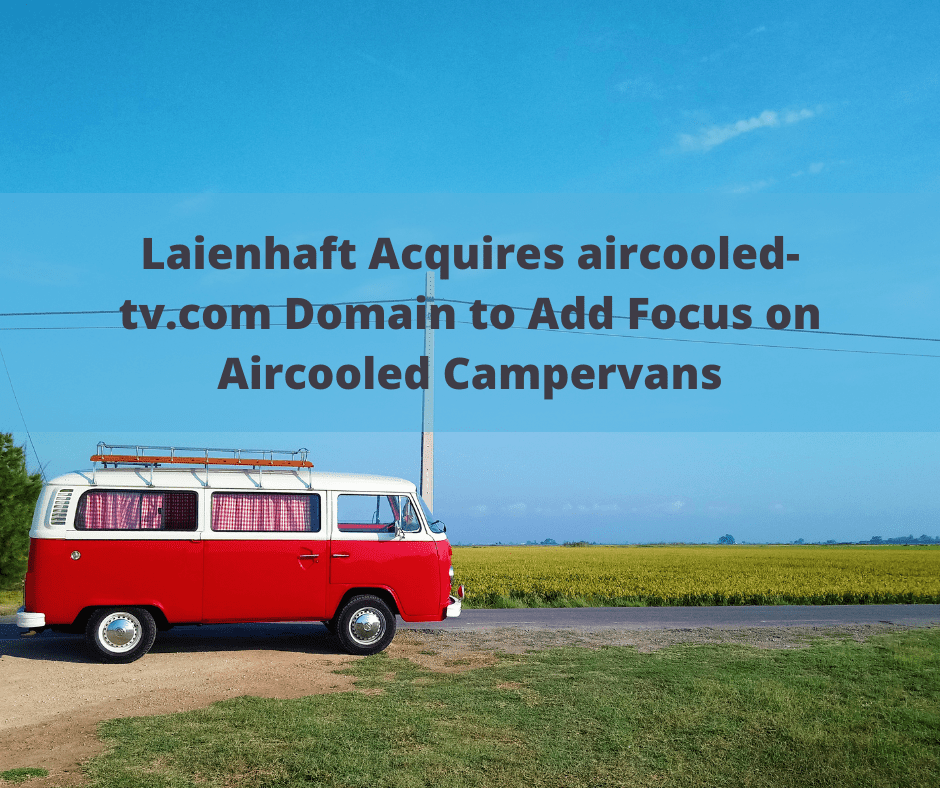
 Beginners Guides1 month ago
Beginners Guides1 month agoLaienhaft Acquires aircooled-tv.com Domain to Add Focus on Aircooled Campervans
-

 Backpacker1 month ago
Backpacker1 month agoLaienhaft Acquires Infos-Campings.Com Domain – Our Joined Way Forward to Experience Outdoor, Camping, and Making Friends and Live the Experience
-
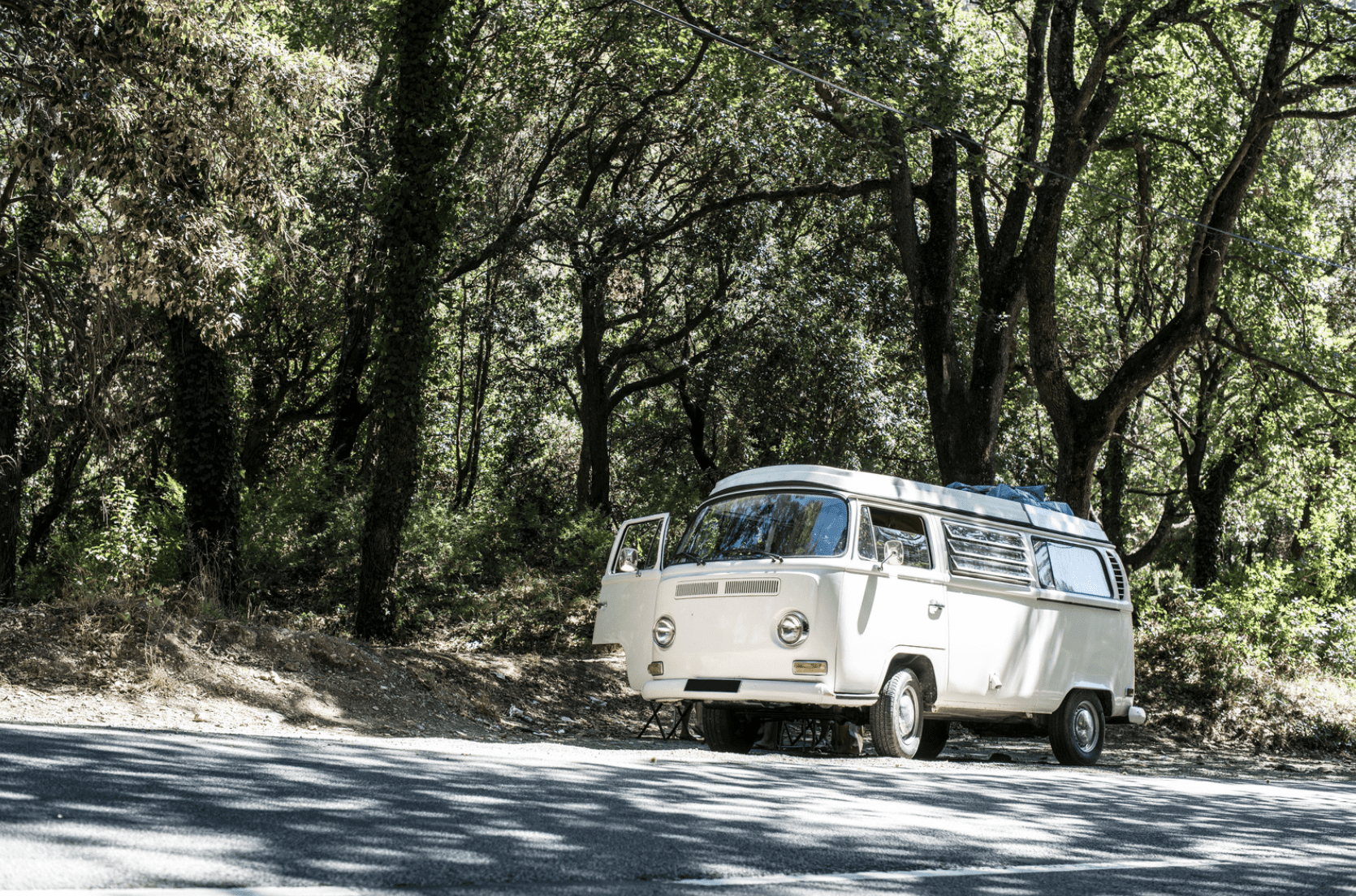
 Beginners Guides1 month ago
Beginners Guides1 month agoThe Guide to the Best Camping License Plate Ideas for Cars and RVs
-
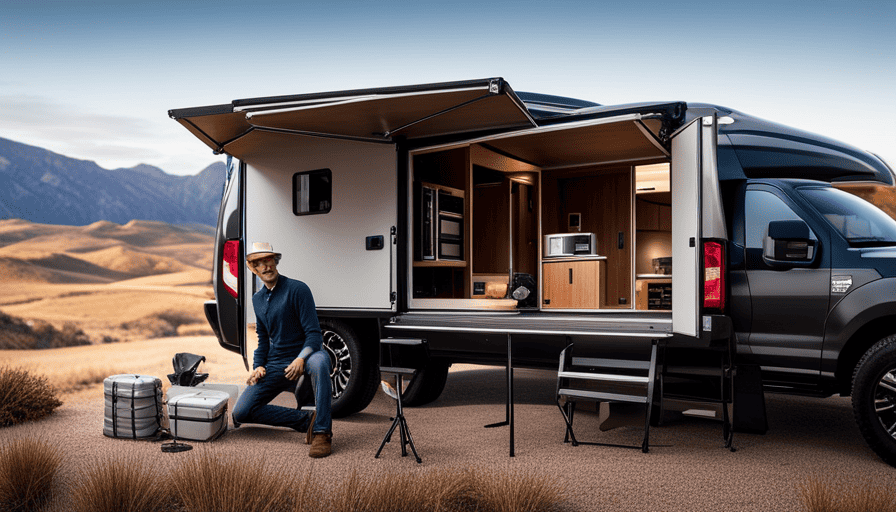
 Beginners Guides2 months ago
Beginners Guides2 months agoHow To Build A Slide In Truck Camper
-
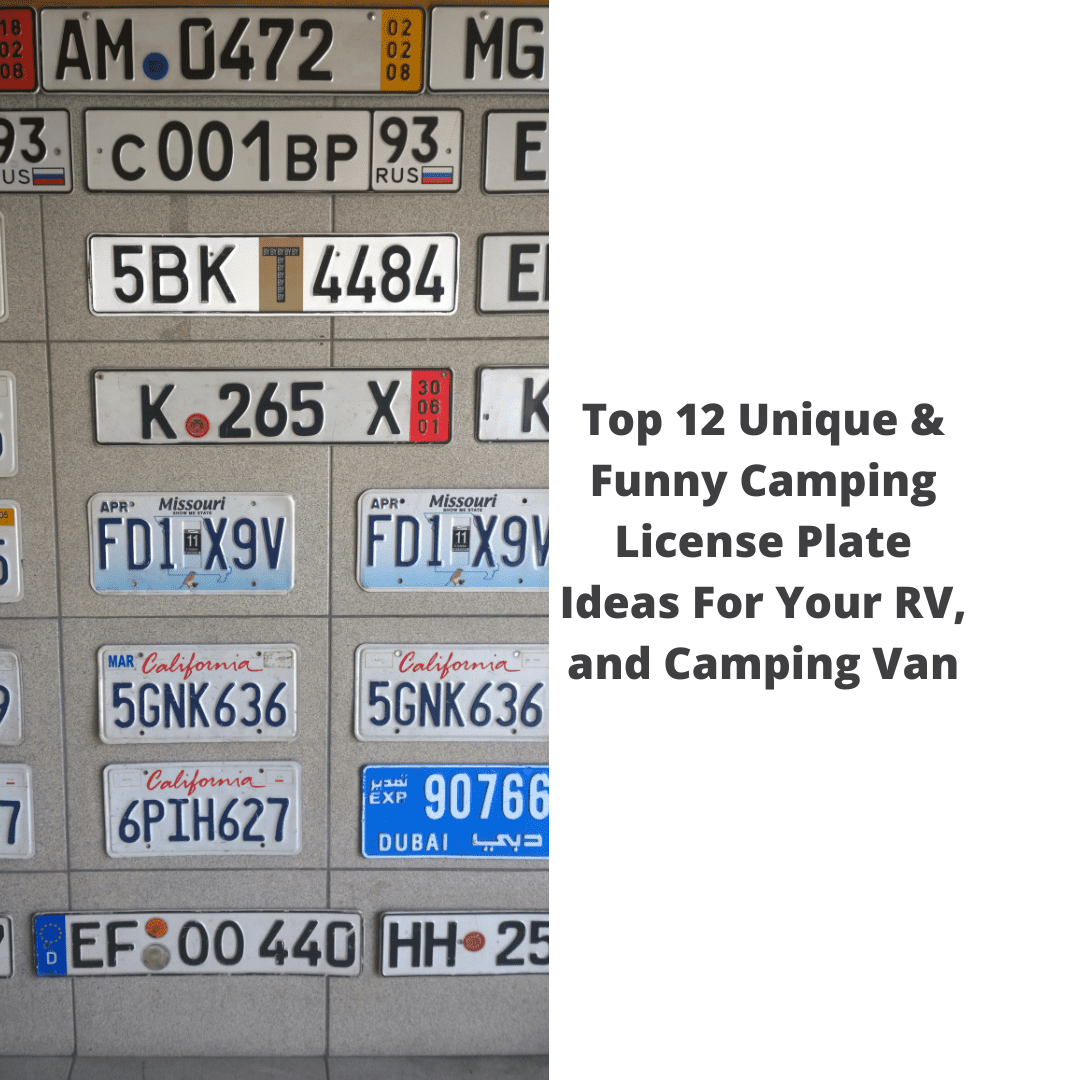
 License Plate1 month ago
License Plate1 month agoTop 12 Unique & Funny Camping License Plate Ideas For Your RV, and Camping Van
-

 Beginners Guides1 week ago
Beginners Guides1 week agoHow To Install A Camper Shell
-

 Beginners Guides2 weeks ago
Beginners Guides2 weeks agoHow To Lubricate Pop Up Camper Lift System
-

 Beginners Guides1 month ago
Beginners Guides1 month agoWhy Does My Throat Hurt After Camping? The Most Common Reasons and How to Fix Them



